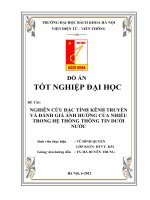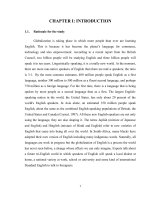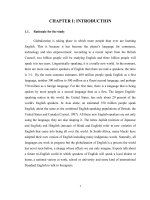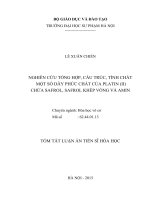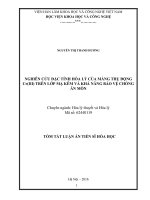NGHIÊN cứu đặc TÍNH PHI văn HÓA CỦA TIẾNG ANH với tư CÁCH LÀ NGÔN NGỮ TOÀN cầu
Bạn đang xem bản rút gọn của tài liệu. Xem và tải ngay bản đầy đủ của tài liệu tại đây (260.4 KB, 51 trang )
CHAPTER I: INTRODUCTION
1.1. Rationale for the study
!
"
#$
%&' ())
%))*))
+*),
#
-./)
0 1 %*)
#
-.!2!'33+4#
5265
472674
1.#
8
6
#
.
1
.
1
,69
555
! 9 9
7
1
6:
7
#.619
.
" .
&
24 1
#.6;7<=
9;><=;><=
24 ;#=
24
. #
.
??:
2
;
6 =
2@'33A41
-"1.
2-"1.41
.-"1.
:
1
#
6
1.2. Aims of the study
, #
86
BC&
• >;#=<
• >
<
1.3. Scope of the study
3
#
#
.6
#.6#
8
1.4. Significance of the study
1C
1
#
6,6
6
6
1C
1
#
B
4
#
1.5. Methodology
1
6.
1.5.1. Research methods
C
1.5.2. Data collection instruments
8
D! :
@E 6
#
1.5.3. Procedures of data analysis
&
•
5
•
•
1.6. Design of the study
&
Chapter one (Introduction)
Chapter two (Literature review and theoretical preliminaries)F
##
Chapter three (Analysis from models of EGL and
discussions) C
#
C
Chapter four (Implications)
"
Chapter five (Conclusion)
B
6
CHAPTER II: LITERATURE REVIEW AND
THEORETICAL PRELIMINARIES
G#
,6
#
.
6 :
2.1. Previous studies
7
#
;=
1'3+H"
.;6=
'3A/;>"= I>JB
K@
;.&
=1'3A3@;
= 1 '33+ D ! #
;=1;=
D86/))/;1
"&I=B@.";>&
= #5I
7
;F##
=,.2/)''4197992/))'4
;9LMNMOPMQPR9S8=
2.2. Key terms and issues related to English as a global language
2.2.1. What is English as a global language (EGL) or an international language
(EIL)?
2.2.1.1. Definition of a global language
!2'33+4;
=2/4.
.2'3+H4;=
;
=2%A4
@2'3AH'33H4
!!2,'4
1!G!6!;
C
=2@'3AH'//4
2/))'4C
&241!
2"'4#
8
! -@ 8T$24G!
2"/4B.U1
@$246!8
!@52,"4
Figure 2.2.1.1:@
6
9
Expanding Circle
100-1000 million
Outer Circle
150-300 million
Inner
Circle
320-380
million
2.2.1.2. Why so many names for English as a global language?
2/))*$B/))(4"
1"21"4>>
. 2.4 # " ,
",2",4
&
•
•
• " #
2'33+4"/"'
2.2.1.3. Characteristics of EGL
.2'3+H4
2B@/))/4&
10
2'4
2/4
1!2@'3A34
2%4
2(4 1
1#6
2.2.2. Reasons for the spread of English
1'3'(,
&24
#C
# 2! '33+ A41
??
6 62
'H))'3))4"2"4
:
1/)
-.
11
"U2'33('*(4
&H)))))
+))
*))
2 !41#,"
H/*2U'33(41
! 9 " 6 1
.>2'33+4
&;=2'%*41
2'33+4
61;
/'##
/)=2'33+4
1 :
@!!2 /))'$D'333$
'33+$5/))H$@'3AH'33H4 2/))'4@
C1
@
@2'33H4
1>.
1'H'+C
68
12
8T#@
I:
1
# 6 .
..>@
:##
;
=2@'33H'%H#'%+4 2/))'4
;#=
2 */34
67;
E
=2 /))'*/34
"
2.2.3. Impacts of EGL
1
2.2.3.1. Impact on the society
8772/)'%4
U
$
1
U7
;=;=
1
9877
13
U
<
2.2.3.2. Impact on the other languages
. 6
6
8 7 7 2/)'% *4
8
9##6,
6;PPVWX=;PPVL
PWX=;QYPZX=
1
;
=
2.2.3.3. Impact on foreign language education policy
I,
:1
14
CHAPTER III: ANALYSIS FROM EGL MODELS AND DISCUSSIONS
1
3.1. Models of EGL
3.1.1. New Englishes/ Kachru
:@
8
"I@2'33/4
67
&
241!2"'4
2! -@8
T4
24G!2"/4
2."4B.
U1@
246!2"%4.!@
5,"2,"4
'))6!
@2'33/4
;#
=2%**4>@
15
6!
1!&;
6$6
=2**4@
1!
3.1.2. Nuclear English/ Quirk
I[
8"[&
'
/
C
%
2['3A/%+4
[
\8
G 0
768
;=6
16
>
\
8;#=
2'3A/(%4[
? ?
2'3A/((4
[8
B
2.'3+H41[
#
U
8
3.1.3. New vs. Nuclear
[8
68274
#\#8
@0#
8
17
>8@
67
6
[0
@[
#
3.2. Discussions: New labels
2
for EGL
1
. 1
16
3.2.1. EIAL/Smith
".
'3+)1
2@][4.
.;=
2'3+H/47
1
2
5/)))
18
6"21"4.1"
6
2.'3+H/41"
#
#
1"
.68
61
8
3.2.2. General English/ Ahulu
1.33+;=
.0??
2'33+'+4?80.
0;
?2'33+'A4
@8
#
6
[0
# #
19
2'33+4
0
.
#
2'33+'34
?=
3.2.3. WSSE & MDM/Crystal
,!2'33*4@2'33/4
7
1!#G!#
6!#
#!
G!1!
6!1
"'"/&;
C\>
<=2!'33*%H%4"'
.,"2!'3334
>!2'33+4@2'33/4
!
"'
1
20
; 6
=2'%(4
!#
&#
U :
!
6 #
##"'
6
!2'33+4#
@2'33/4
7!
1!>!
2'3334@
6!
.D!'33+"
7
6
&
?>$#
21
1
?2!'3AA/H*4
!
> 1#
U
6
2!'33+'%A4
3.2.4. EIL/Modiano
BB
1"21"41"B
?
##?2'333&/+4
1"
#
"'
$6
6
1"C
#
1B2'3334"'
&;U#1"
1"C
#=2/*4#"'
22
@2'33/4"'
B
:
#"'B2'3334
:1"1"'
6C1"
1"6
B;
=#
>
2'3334
@2'33H4CB#"'
6"'1
2'3334
6
!$
23
3.3. The culture-free characteristic of EGL
72
410C&
<
.!BD
&
1 It is English used for international communication
2 It must be learned by native speakers as well as non-native speakers8
;
=2'33++4#
#
3 It is neutral1";=
2U>'3A(4
4 1?the vehicle of any culture to
which a user applies it=2 '33(')'4
5 It has a common core of shared syntactical and grammatical features
8
12D
'3A3(H(4
24
6 It is no longer controlled by British or American culture1
2! '33+4 1
#2>'33+4
3.3.1. Neutrality
U
;=7
62
9 4 1 ;
=6
B
6
1
;=2
4
3.3.2. The common core
[08
25




